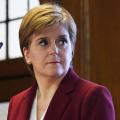
There is currently a democratic exercise taking place across the UK - one which will have profound consequences for all of us, but in which only a tiny percentage of the population actually have a vote.
I’m talking, of course, about the race to be the next Prime Minister.
The successful applicant for this most crucial of job vacancies will be chosen by Conservative party members alone.
Bluntly, if the people of Scotland were to have a say, I don’t think we’d choose either Rishi Sunak or Liz Truss. Our answer would be ‘none of the above’.
After all, Scotland hasn’t voted Tory since the 1950s. And they offer no solutions to the challenges we face now.
We are in the midst of a cost-of-living crisis unlike anything most of us have ever experienced.
People are seeing their weekly shop become more and more expensive and face eye-watering increases to their energy bills.
But rather than a positive, policy-focused battle of new ideas, the Tory leadership campaign has descended into barely relevant issues, personal attacks and childish jibes about the clothes and jewellery the candidates are wearing.
To be fair, we have heard some pretty frank admissions of the mess the Tories have led the UK into - which is deeply ironic given that both candidates have been key members of the Tory government which is responsible for that mess.
Years of Tory policy failings - from attacks on benefits, to pay freezes, the failure of their energy policy, and of course Brexit - have all taken their toll on household budgets, and left too many people with little financial resilience.
It is true to say that many countries are experiencing pressures on living standards at the moment. But it is equally true to say that the situation is particularly bad in the UK.
In fact, the OECD (Organisation for Economic Co-operation and Development) has warned that the UK will have the lowest economic growth of any country in the G20 apart from sanction-hit, war-mongering Russia.
What we haven’t heard from either candidate are any urgent or meaningful proposals to turn this situation around.
Instead, in an attempt to win votes from the Tory faithful, we are hearing pledges to return to the policies of Margaret Thatcher.
Policies which in their day, of course, were responsible for the soaring poverty and income inequality which continue to scar communities in Scotland and the UK to this day.
Rather than putting forward ideas for the future, the Tories are hell-bent on recreating the past.
One difference between now and the 1980s, of course, is that we have a Scottish Parliament, and that has given us some ability to take different decisions.
Within the devolved powers and our largely fixed budget, the SNP Government is doing everything we can to help those in need, allocating almost £3bn this year to a range of supports that will help mitigate the impact of increased costs on households.
We’ve introduced many benefits that are not available anywhere else in the UK, such as the Scottish Child Payment, now doubled to £20 a week. We are also mitigating the bedroom tax for about 90,000 households and offering free school meals to all kids in P1-P5.
But the fact is that most of the economic levers in this crisis remain reserved to Westminster.
And that is why the democratic deficit that exists is so damaging.
Key decisions are being taken affecting our lives at Westminster - but we have no say over them.
It feels like whoever wins this contest, Scotland loses.
Both candidates have made clear they will ignore the democratic voice of the Scottish people, who last year elected a parliament committed to giving us all a say on our future.
In a perverse logic, Rishi Sunak’s excuse appears to be that because the UK is in so much of a mess right now, democracy has to be put on hold.
But it is precisely because of the UK’s broken economic model that resource-rich Scotland needs to become independent.
The anti-democratic attitude towards Scotland from all of Westminster’s parties - let’s not forget that Keir Starmer’s Labour Party is taking the exact same stance as the Tories on this, and many other issues - is actually helping make the case for Scotland becoming an independent nation.
Scotland will have its say in a referendum we hope will be on October 19 next year. But if Westminster does block that, the next general election will be the opportunity for people to give their view.
And rather than being a bystander on the key decisions affecting Scotland, as an independent nation we can decide how to use Scotland’s immense natural and human resources to build an economy which is fairer and more sustainable - and fully focused on supporting people through tough times.
Whoever becomes the next Prime Minister, I will do my best to work constructively with them in Scotland’s interests.
But if we were expecting any dramatic change of direction from the disastrous Westminster policies of the last few years, this Groundhog Day leadership contest is telling us not to hold our breath.



Comments & Moderation
Readers’ comments: You are personally liable for the content of any comments you upload to this website, so please act responsibly. We do not pre-moderate or monitor readers’ comments appearing on our websites, but we do post-moderate in response to complaints we receive or otherwise when a potential problem comes to our attention. You can make a complaint by using the ‘report this post’ link . We may then apply our discretion under the user terms to amend or delete comments.
Post moderation is undertaken full-time 9am-6pm on weekdays, and on a part-time basis outwith those hours.
Read the rules hereLast Updated:
Report this comment Cancel